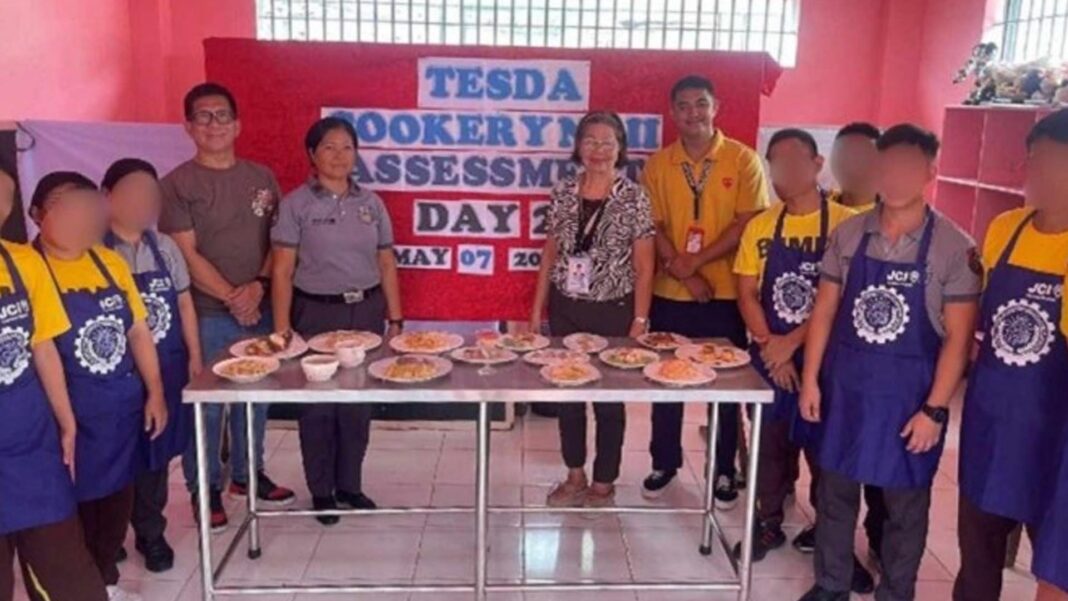More than 112,000 persons deprived of liberty (PDLs) have joined the Bureau of Jail Management and Penology’s (BJMP) livelihood and skills training programs in jails across the country.
This is part of the Department of the Interior and Local Government’s (DILG) commitment to carry out the directive of President Ferdinand R. Marcos, Jr. to deliver justice with compassion and build a Bagong Pilipinas where no one is left behind, not even those behind bars, the DILG said in a news release on Sunday.
The PDLs are also being equipped with livelihood and technical skills to boost their employment prospects post-release.
In coordination with the Technical Education and Skills Development Authority (TESDA) and civil society partners, 112,707 PDLs have completed training programs in carpentry, electronics, welding, arts and crafts, and small-scale entrepreneurship.
The BJMP hopes to give over PDLs under its care — real change and a renewed sense of purpose. But behind this number are real stories of pain, hope, and transformation.
One of them is Sandy Pagobo, a former PDL from Danao City Jail and a single father to three children. His journey to change started inside a jail cell, not outside it.
While serving time, Sandy enrolled in the Shielded Metal Arc Welding Training offered by Cebu Technological University. His dedication inspired him to teach and mentor fellow PDLs through the Sari-Sari Skills Training Program PDL Edition.
He now works as a pipe fitter in Al Jubail, Saudi Arabia.
“This is all for my change, Ma’am. For my three children, whom I want to finish college. That’s why I was determined to go abroad and by God’s grace, I made it,” Sandy said in Cebuano.
Lisa (not her real name), who is currently detained at Legazpi City Jail, learned how to make doormats, bayong bags, dishwashing liquid, and even how to grow food through hydroponics through the DILG’s livelihood program.
Her earnings as a livelihood worker now allow her to send PHP1,000 a week to her son, who is in Grade 12.
“Akala ko dati wala na akong patutunguhan. Pero dahil sa mga livelihood programs, natuto ako ng mga kasanayan na hindi ko akalaing magagamit ko kahit nakakulong ako. Nakakatulong na ako ngayon sa anak ko kahit ganito ang sitwasyon ko (“I thought I had nowhere to go. But because of the livelihood programs, I learned skills that I never thought I would be able to use even when I was in prison. Now I am able to help my son even though I am in this situation),” said Lisa.
Joy, another PDL in Balungao District Jail, found her turning point in the kitchen. A single mother of two, Joy had juggled multiple informal jobs before she was detained. Her transformation began when she joined the Cookery NC II program, a 40-day culinary course offered by TESDA in partnership with BJMP.
Now, she helps run the jail’s internal kitchen, feeding fellow PDLs and mentoring other women along the way. Her dream is to open a small carinderia when she’s released—one that welcomes and empowers other women like her.
“Gusto kong pakainin hindi lang ang sikmura, kundi pati ang mga pangarap ng mga taong katulad kong naligaw ng landas. Sa pagluluto, nabalik ‘yung kumpiyansa ko sa sarili. Ngayon, may pag-asa na ulit akong maibigay ang magandang kinabukasan para sa mga anak ko (I want to feed not only the stomach, but also the dreams of people who have lost their way like me. Through cooking, I have regained my self-confidence. Now, I have hope to provide a good future for my children again),” said Joy.
Over 10K PDLs complete basic education, earn college degrees
Meanwhile, BJMP said that education does not stop at the jail gates, more than 10,000 persons PDLs continue to access education and skills training to prepare them for reintegration into society.
To date, some 10,739 PDLs have completed elementary and high school levels while in detention through the Department of Education’s Alternative Learning System.
PDLs enrolled under ALS also receive their Time Allowance for Studying, Teaching, and Mentoring, as provided under Republic Act 10592, recognizing their effort to improve themselves while serving time.
Beyond basic education, 107 PDLs have earned their college degrees under the Tertiary Education Behind Bars Program in partnership with the Commission on Higher Education.
An additional 720 PDLs are currently enrolled in various degree programs, with BJMP actively working to expand this initiative by building new partnerships with colleges and universities nationwide.
“Simple lamang ang ating mensahe. Hindi kailanman hadlang ang kawalan ng kalayaan sa pagkamit ng pangarap na makapag-tapos ng pag-aaral (Our message is very simple. The lack of freedom is never a hindrance to achieving the dream of completing education),” BJMP chief Jail Director Ruel Rivera said during its 34th founding anniversary last July 2.
These results reflect the government’s commitment to holistic and meaningful rehabilitation, aligned with President Marcos Jr.’s call to build “a world where justice and compassion prevail.”
As an attached agency of the DILG, BJMP has operational and administrative control over all city, district, and municipal jails in the country.
Through continued investment in education and livelihood training, the DILG and BJMP are enabling PDLs to return to society as reformed and productive citizens. (PNA)


